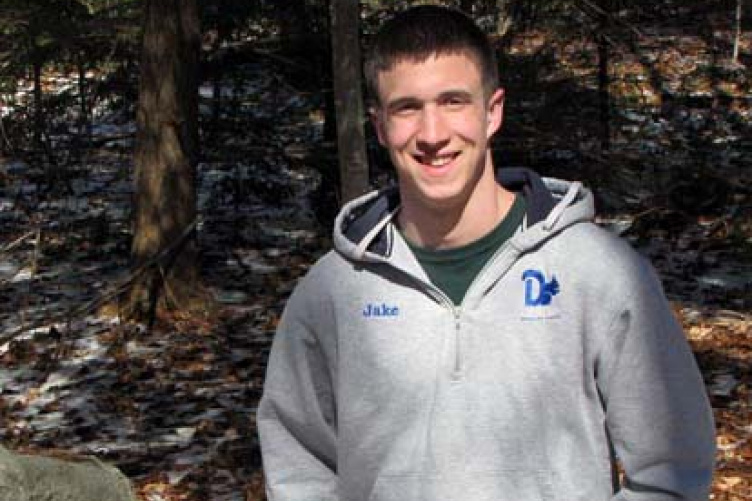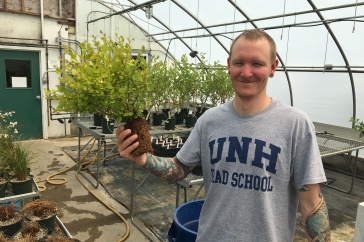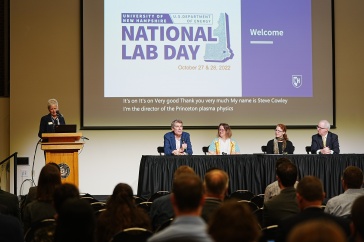
Jake DeBow Learns the Family Business in COLSA’s Living Labs
At home in the woods: Jake DeBow has an abiding love for the Granite State with its immediate access to the natural world and abundant wildlife. Photo by Victoria Forester Courtland
Jake DeBow ‘15 was only eight-years-old when he accompanied his father, Paul ‘88, to check on a trap set out for a beaver. It was a cold winter night in Northern New Hampshire when Paul parked his truck on the dark road and clicked on a flashlight to surveil the surroundings. Not knowing what to expect, the two hiked through the snow in silence with the wavering beam of light guiding their way to the pond.
“The beaver was still alive when we got there,” says Paul who allowed Jake to stay with the animal while he ran back to the truck with the flashlight to retrieve his rifle.
The experience made a deep impression on the young boy, who had already been drawn to his father’s adventures as a licensed wildlife control operator. Trapping and hunting was a way of life for Jake, who loved growing up in New Hampshire with its immediate access to the natural environment and abundant wildlife. He developed a sense of awe and respect for all animals, revering them as a source of beauty and nourishment and – through watching his father work – determining when damage control measures were needed to protect people and their property.
When Jake was a teen, Paul began taking him on jobs to control animal pests in customer’s houses, mostly involving the removal of bats and rodents. “He picked it up quickly and was really good at it,” says Paul. However, as a first-generation college student, Paul began to worry about his son’s growing interest in becoming a game warden. “I tried to steer him toward studying engineering or law in college, since the wildlife field is not always that profitable,” says Paul.
But it was too late: Jake’s love of the natural world was simply in his blood.
Jake enrolled at UNH to immerse himself in the study of wildlife and conservation biology just two decades after his father completed his own UNH education in wildlife ecology.
|
Paul DeBow warms the bear cub. Courtesy photo. |
When Paul DeBow was a senior, he was asked by Professor of Wildlife Ecology John Litvaitis to accompany graduate student Doug Kane to the White Mountains, where the two would track bears to replace their radio collars and tag their ears. “We snowshoed up the mountain and used telemetry to find the den,” says Paul. “Doug saw a little hole, took off his snowshoe, and began scooping the snow away.” As the graduate student dug deeper, Paul could see the strata from each storm where the bear’s body heat had melted the snow until, finally, the den was exposed. Doug used a long pole to jab the mother bear with anesthesia, then reached inside, grabbed a cub, and held it out to Paul. “The cub was screaming bloody murder until I stuck it in my jacket and it quieted right down,” says Paul. “It had never seen the light of day or felt such cold air.”
After graduation, Paul parlayed his ample hands-on experience in the wildlife ecology program to secure a job as a wildlife technician with the U.S. Department of Agriculture. In that position, he worked alongside the State Fish and Game wildlife damage agent in the field, dealing with nuisance bears, assessing damage, and occasionally setting foot snares or culvert traps for problem animals. “I worked with the public on wildlife-related problems, including responding to seasonal calls for assistance with bears that would show up in any scenario you could imagine,” says Paul, “breaking into sheds for a bag of garbage, demolishing bee hives, bird feeders, gas grills, pet food, you name it."
Later, Paul expanded his career with the USDA, working as a biologist in Florida before returning to New Hampshire to start his own wildlife control business, DeBow Wildlife Service, in Plymouth.
Jake continues to work with his father during university holidays. “It’s awesome to follow in his footsteps and share some of the same experiences. When I run into roadblocks, he’s been through it before and can give me advice at work and at school,” says Jake. “Plus, it’s made our relationship closer. We can talk about my classes and the ecological processes I’m learning about, and he familiar with all the terminology in the lab reports.” This summer, Jake will share in his father’s experience of using telemetry and will work with Professor of Wildlife Ecology Peter Pekins – who was just beginning his career at UNH when Paul graduated – to track moose in the White Mountains.
Taking advantage of a variety of educational and extra-curricular opportunities at the University, Jake keeps busy as a member of the National Forestry Honor Society Xi Sigma Pi, agricultural fraternity Alpha Gamma Rho, and a past participant of the National Student Exchange program with the University of Montana in Bozeman. “Being a part of Alpha Gamma Rho and having the opportunity to study in Montana have been two of the biggest gifts UNH has given me. These experiences have made a huge contribution toward my success here,” says Jake who, while attending school out West for a semester, hunted elk on the side and got a job butchering big game.
Back on campus in Durham, Jake counts Peter Pekins and Associate Professor of Forest Ecology Tom Lee among his greatest mentors. “Their classes are amazing and they provide these incredible opportunities,” says Jake of the experiential education he’s enjoyed in classes like Field Dendrology and Wildlife Ecology, which bring him out of the classroom and into the University’s living labs at College Woods, East Foss Farm, Woodman Farm, and Kingman Farm. “You can’t thank someone enough for that,” Jake says, fully expecting to bring his understanding of ecological systems to bolster the family business after graduation.
Originally published by:
COLSA Insight, Newsletter of the College of Life Sciences and Agriculture
-
Written By:
Staff writer | Communications and Public Affairs




















































